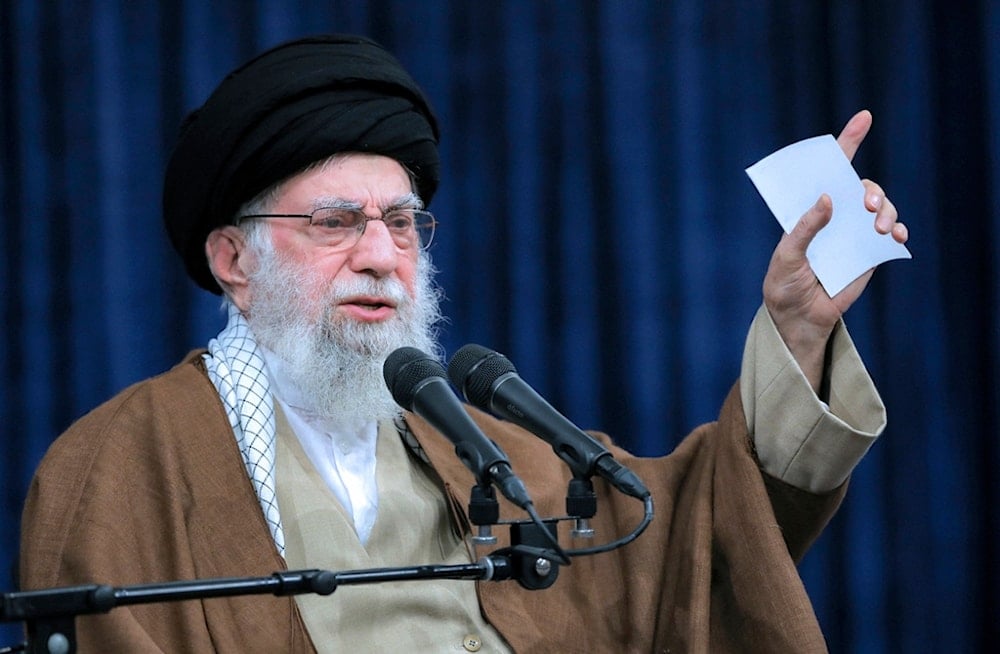US 'miscalculated' on Iran since revolution, Sayyed Khamenei says
Iranian leader Sayyed Ali Khamenei criticizes the United States policies on Iran over the past few decades since the Islamic Revolution.
-

In this photo released by an official website of the office of the Iranian leader, Islamic Revolution Leader Ayatollah Sayyed Ali Khamenei speaks in a meeting in Tehran, Iran, Wednesday, Dec. 11, 2024 (Office of the Iranian Leader)
The United States has repeatedly miscalculated in its approach toward Iran over the past several decades, the leader of the Islamic Revolution and the Islamic Republic of Iran Sayyed Ali Khamenei said Wednesday. His remarks came during a meeting on Wednesday with residents of Qom, commemorating the January 9, 1978, uprising that set the stage for the 1979 Islamic Revolution.
Addressing the gathering, Sayyed Khamenei emphasized that Iran's Islamic Revolution emerged from what was once a stronghold of American interests under the Pahlavi monarchy. "Under the [regime of Iran's former] Pahlavi [monarchy], the country used to serve as a formidable fortress for American interests," he said. "It was from the heart of this fortress that the Revolution was born and bubbled up. The Americans did not realize [this], were duped, lagged behind, and became oblivious."
The Leader labeled this oversight a "miscalculation" and argued that such errors have persisted since the Revolution. "After the Revolution, the Americans perpetrated mistakes concerning Iran throughout these several decades on most occasions," he stressed.
US animosity stems from loss
Sayyed Khamenei noted that Washington's animosity stems from losing political and economic leverage in Iran following the Revolution. "The US has lost a massive political and economic wealth as a result of Iran's Revolution. And it has expended much fortune over the past 40-odd years towards taking Iran out of the Islamic Revolution's grip," he said, stressing that such efforts have repeatedly failed.
He described the US' hostility as stemming from a "profound rancor" rooted in its inability to regain control over Iran. "The US had brought Iran under its possession, but the country was wrested out of its grip and control. Therefore, its grudge towards the Islamic Republic and the Revolution is long-standing," he remarked.
While acknowledging limited diplomatic ties with some European nations, the leader of the Islamic Revolution highlighted a fundamental difference in Iran's approach to Europe and the US. His comments also addressed questions about why Tehran was willing to engage with European states but refrained from negotiating with Washington.
"The US is after making up for its defeat. Therefore, it resorts to whatever sort of enmity towards Iran that it can," he said.
Iran ready for dialogue
This comes after Iranian Foreign Minister Abbas Araghchi on Saturday stressed that Tehran was ready to hold constructive negotiations to achieve an agreement for its nuclear program.
In an exclusive interview for China's CCTV on Friday, Araghchi conveyed Tehran's willingness to resume talks, emphasizing the goal of reaching an agreement, and engage in constructive talks "without delay".
He further explained that the Islamic Republic's approach remains consistent with the original JCPOA framework: building trust regarding Iran's nuclear program in exchange for lifting sanctions. "We are ready to negotiate on this foundation," he added.
Araghchi highlighted that Iran negotiated the Joint Comprehensive Plan of Action (JCPOA) in good faith over two years, achieving an agreement widely praised as a diplomatic success, stressing that Iran upheld its commitments, but the US unilaterally withdrew without justification, calling it a strategic mistake that led to increased sanctions.
However, one round of negotiations with European countries has already occurred, with another planned in the next two weeks. Regarding the US, Araghchi added that Iran will respond once the Trump administration finalizes its policy.

 4 Min Read
4 Min Read








